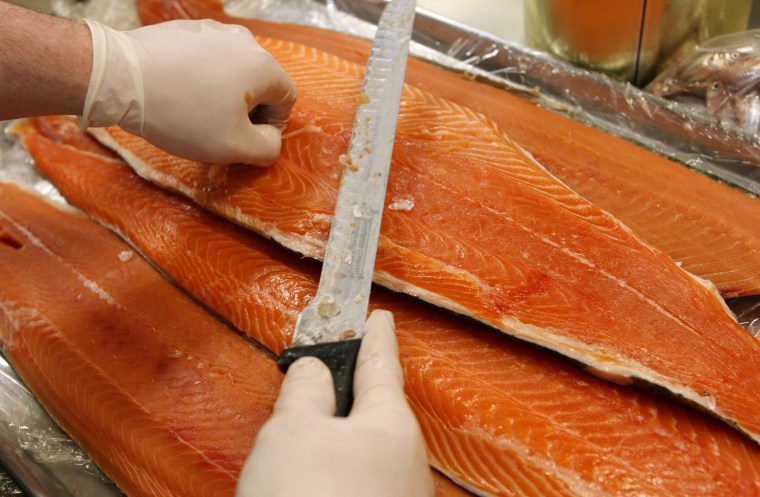Salmon genetically modified to grow faster is safe to eat and may be sold in the United States, federal regulators said Thursday.
Companies can voluntarily label the salmon as genetically modified, or GM, but they don’t have to, the Food and Drug Administration said.

“The FDA has approved AquaBounty Technologies’ application for AquAdvantage Salmon, an Atlantic salmon that reaches market size more quickly than non-GE farm-raised Atlantic salmon,” the agency said in a statement.
"There is no credible evidence that these fish are a risk to either human health or the environment."
The decision, which has taken five years, is certain to anger consumer groups who want companies to be forced to label GM foods and environmental groups who are afraid the modified fish will breed with wild fish.
But experts on genetically modified foods said the decision is long overdue, and they say people should not be scared of eating gene-engineered food.
“The FDA has thoroughly analyzed and evaluated the data and information submitted by AquaBounty Technologies regarding AquAdvantage Salmon and determined that they have met the regulatory requirements for approval, including that food from the fish is safe to eat,” said Bernadette Dunham, director of the FDA’s Center for Veterinary Medicine.
The salmon cannot be grown in the U.S., the FDA said.
“The AquAdvantage Salmon may be raised only in land-based, contained hatchery tanks in two specific facilities in Canada and Panama,” FDA said. The fisheries are taking care to make sure the modified salmon don’t escape into the wild.
The FDA also said it would not require companies to label genetically modified food.
“We recognize that some consumers are interested in knowing whether food ingredients are derived from GE sources,” said Susan Mayne, director of the FDA’s Center for Food Safety and Applied Nutrition. “The FDA is issuing two guidance documents that explain how food companies that want to voluntarily label their products can provide this information to consumers.”
Several retailers have said they won't sell the GMO fish, including Whole Foods, Trader Joe's and others.
"The FDA is issuing two guidance documents that explain how food companies that want to voluntarily label their products can provide this information to consumers.”
Dr. William Muir, a genetics and aquaculture professor at Purdue University, said GM salmon is a safe alternative to wild salmon.
“The scientific review is clear. There is no credible evidence that these fish are a risk to either human health or the environment,” Muir said in a statement.
“In contrast, the current practice of using wild-caught salmon as a food source is not sustainable, our oceans are overfished.”
Massachusetts-based AquaBounty has genetically engineered the salmon using two genes from two different species of fish that make it grow faster. Critics worried mostly that the fish would escape and breed with wild fish. FDA said it will inspect the facilities to make sure that’s impossible.
“Five years ago FDA scientists determined that the food from AquAdvantage salmon was 'as safe as food from conventional salmon' and that the proposed physical, biological and genetic confinement of the fish in the highlands of Panama posed minimal environmental risk,” said animal geneticist Dr. Alison Van Eenennaam, who helped advise the FDA on the decision.
“The unexplained five year delay in the FDA’s regulatory decision regarding the AquAdvantage was unprecedented and today’s decision is long overdue."
This will be the first genetically modified animal approved to eat in the U.S. although people already eat GM corn, soybeans and potatoes.
